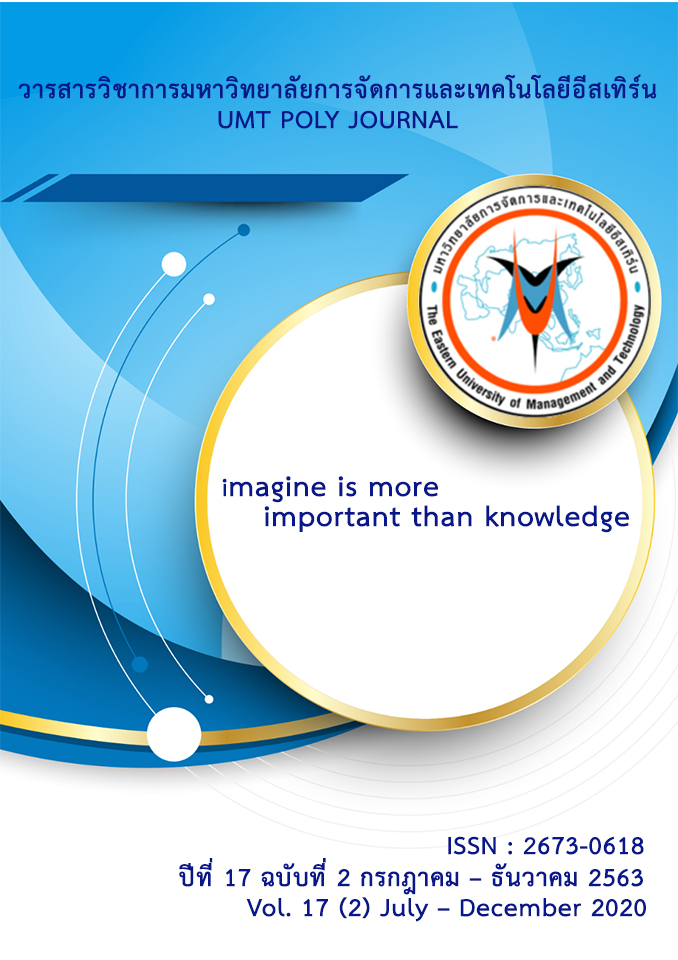A Research on Influence of Psychological Capital of Chinese (mainland area) University Teachers upon performance---Based on Motivational Work Behavior and working thriving as an Intermediary Variable
คำสำคัญ:
The teachers of university in china psychological capital job thriving, Motivational work behavior performanceบทคัดย่อ
With the continuous advancement of information technology, the way people acquire knowledge and teaching are also changing. The relationship between teaching and learning in colleges have also undergone revolutionary changes. Colleges need to enhance their own competitiveness, that means Teachers need to increase scientific research and teaching output. This puts new and higher requirements on the ability of teachers. How to inspire teachers’job thriving, and increased performance, It has become an important issue in current organizational behavior. From the perspective of psychological capital in college organizations, the author constructs a model with psychological capital as an antecedent variable and individual motivational work behavior to influence teacher performance through the job thriving. From the mainland China, 600 teachers are selected as data samples, and 519 valid samples are received, and using SPSS24 and AMOS24 testing and analysis data, the empirical results show that: (1) individual psychological capital is related to the job thriving but does not have a direct relationship, need to use the motivational work behavior as a mediator; (2) motivational work behavior positively predict the performance of teachers through the job thriving; (3) Through the integration of models, psychological capital is used as an antecedent variable in the process of the job thriving influenced teachers' performance.
Downloads
เอกสารอ้างอิง
Avey, J.B. (2007). The performance impact of leader positive psychological capital and situational complexity. ETD collection for University of Nebraska-Lincoln, Paper AAI 3252825.
Avey, J.B., & Luthans, F., et al. (2010). Impact of positive psychological capital on employee well-being over time. Journal of Occupational Health Psychology, 15(1): 17.
Avey, J.B., & Avolio, B.J., et al. (2011). Experimentally analyzing the impact of leader positivity on follower positivity and performance. The Leadership Quarterly, 22(2): 282-94.
Bao Wei, Wang Jiaying. (2012) The Pressure in the Ivory Tower: An Empirical Study of the Occupational Stress and Academic Output of Chinese University Teachers. Peking University Education Review, 10(1): 124-138.
Cheung, F., So-kum., & Tang, C., et al. (2011). Psychological capital as a moderator between emotional labor, burnout, and job satisfaction among school teachers in
China. International Journal of Stress Management, 18(4): 348.
Chen, D.J., & Lim, V.K. (2012). Strength in adversity: The influence of psychological capital on job search. Journal of Organizational Behavior, 33(6): 811-39.
Gupta, V. (2013). Development of a Causal Framework Linking High Performance HRM Practices, Positive Psychological Capital, Creative Behaviors and Performance,. 2013(2):16-22.
Harms, P.D., & Luthans, F. (2012). Measuring implicit psychological constructs in organizational behavior: An example using psychological capital. Journal of Organizational Behavior, 33(4): 589-94.
Jensen, S.M., & Luthans, F. (2006). Relationship between entrepreneurs’ psychological capital and their authentic leadership. Journal of Managerial Issues. 254-73.
Kim T Y, Liu Z, Diefendorff J M. (2015). Leader-Member Ex-change and Job Performance: The Effects of Taking Charge and Organizational Tenure. Journal of Organizational Behavior, 36(2):216-231.
Kim T Y, Liu Z.(2017).Taking charge and employee outcomes:the moderating effect of emotional competence. International Journal of Human Resource Management, 28(5):775-793
Letcher. (2004). Feeling good and doing great: The relationship between psychological capital and well-being. Journal of Occupational Health Psychology, 15(4): 421.
Luthans, F., & Avolio, B.J., et al. (2005). The psychological capital of Chinese workers: Exploring the relationship with performance. Management and Organization Review, 1 (2): 249-71.
Luthans, F., & Vogelgesang, G.R., et al. (2006). Developing the psychological capital of resilience. Human Resource Development Review. 5(1): 25-44.
Luthans, F & Avey, J. B., et al. (2006). Psychological capital development: toward a micro-intervention. Journal of Organizational Behavior, 27(3): 387-93.
Larson, M., & Luthans, F. (2006). Potential added value of psychological capital in predicting work attitudes. Journal of Leadership & Organizational Studies, 13(2): 75-92.
Luthans, F., & Avolio, B.J., et al. (2007). Positive psychological capital: Measurement and relationship with performance and satisfaction. Personnel Psychology, 60 (3): 541-72.
Luthans, F., & Norman, S.M., et al. (2008). The mediating role of psychological capital in the supportive organizational climate-employee performance relationship. Journal of Organizational Behavior, 29 (2): 219-38.
Luthans, F., & Avey, J.B., et al. (2010). The development and resulting performance impact of positive psychological capital. Human Resource Development Quarterly, 21(1): 41-67.
Li R, Zhang Z Y, Tian X M. (2016). Can self-sacrificial lead-ership promote subordinate taking charge? The mediating role of organizational identification and the moderating role of risk aver-sion.Journal of Organizational Behavior,37(5):214-216.
Norman, S.M., & Avey, J.B. (2010). The interactive effects of psychological capital and organizational identity on employee organizational citizenship and deviance behaviors. Journal of Leadership & Organizational Studies, 17(4): 380-91.
Newman A, Schwarz G, Cooper, B. (2015). How Servant Leadership Influences Organizational Citizenship Behavior: The Roles of LMX, Empowerment, and Proactive Personality. Journal of Business Ethics,145:1-14.
Peterson, S.J., & Luthans, F., et al. (2011). Psychological capital and employee performance: A latent growth modeling approach. Personnel Psychology, 64(2): 427-50.
Rego, A., & Sousa, F. (2012). Authentic leadership promoting employees’ psychological capital and creativity. Journal of Business Research, 65(3): 429-37.
Riolli, L., & Savicki, V. (2012). Psychological Capital as a Buffer to Student Stress. Psychology, 3(12A): 1202-7.
ดาวน์โหลด
เผยแพร่แล้ว
ฉบับ
ประเภทบทความ
สัญญาอนุญาต
ประกาศลิขสิทธิ์
เนื้อหาและข้อมูลในบทความที่ลงตีพิมพ์ในวารสารวิชาการมหาวิทยาลัยการจัดการและเทคโนโลยีอีสเทิร์น ถือเป็นข้อคิดเห็นและความรับผิดชอบของผู้เขียนบทความโดยตรง ซึ่งกองบรรณาธิการวารสารไม่จำเป็นต้องเห็นด้วยหรือร่วมรับผิดชอบใด ๆ
บทความ ข้อมูล เนื้อหาหรือรูปภาพ ฯลฯ ที่ได้รับการตีพิมพ์ในวารสารวิชาการมหาวิทยาลัยการจัดการและเทคโนโลยีอีสเทิร์น ถือเป็นลิขสิทธิ์ของวารสารวิชาการมหาวิทยาลัยการจัดการและเทคโนโลยีอีสเทิร์น หากบุคคลหรือหน่วยงานใดต้องการนำข้อมูลทั้งหมดหรือบางส่วนไปเผยแพร่ต่อหรือเพื่อกระทำการใด ๆ จะต้องได้รับอนุญาตเป็นลายลักษณ์อักษรจากวารสารวิชาการมหาวิทยาลัยการจัดการและเทคโนโลยีอีสเทิร์นก่อนเท่านั้น




